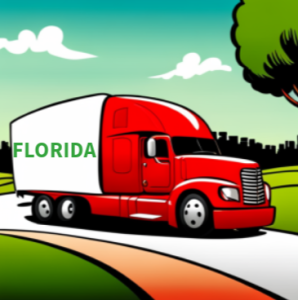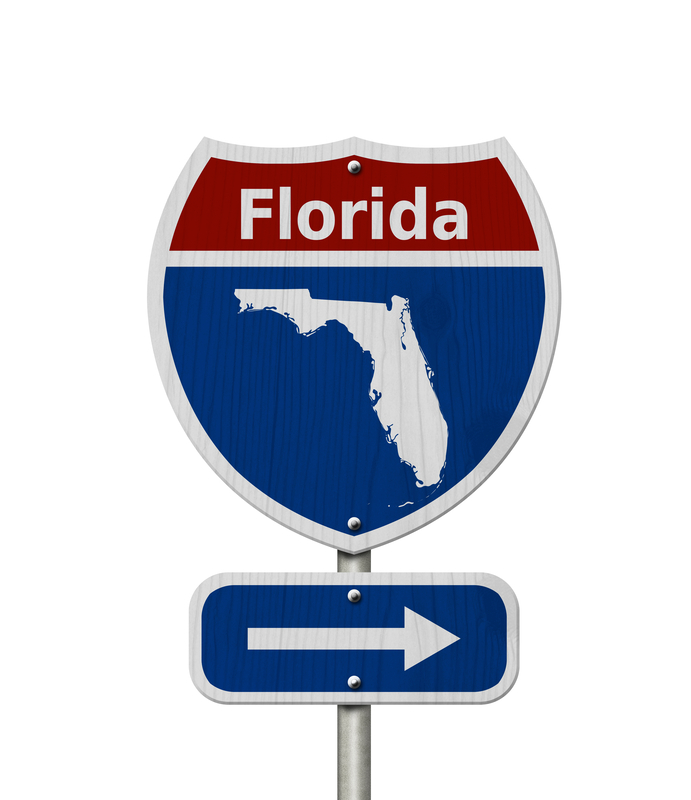If you’re a Motor Carrier moving goods across state lines, you’ve got to meet the FMCSA’s minimum Commercial Auto Liability Requirements—GEICO just rolled into the Sunshine State to make it way more affordable for you!
Florida Commercial Truck Insurance Requirements start with requirements set by FMCSA.
FMCSA is the Federal Motor Carrier Safety Administration which oversees the U.S. Department of Transportation.
In order to drive legally, commercial trucks hauling freight for hire across state lines must first register with FMCSA.
FMCSA then assigns you a DOT number.
That’s when proof of Commercial Auto Liability Insurance is required.
Your insurance company–likely GEICO or Progressive– sends that proof directly to FMCSA with a BMC-91X Filing.
The MCS-90 is just the endorsement to your policy which guarantees the insurance–it’s like a bond making a promise.
At the same time your insurance company will send your proof of insurance to FDOT, the Florida Department of Transportation.
You will also need a BOC-3 form.
Once completed all this is completed you are granted your MC#–Motor Carrier Operating Authority which makes you legal to haul freight for hire across state lines.
How about a handy cheat sheet for the specific Steps to your Motor Carrier Authority courtesy of CIS?:)
What are Florida’s Minimum Insurance Rules for Interstate Truckers?
The same as FMCSA Commercial Auto Liability Requirements for Motor Carriers:
$750,000 minimum for Commercial Trucks hauling general freight
$300,000 minimum for Commercial Trucks hauling household goods
$300,000 minimum for Commercial Van and Sprinter Insurance
Why is Commercial Truck Insurance so expensive in Florida?
Commercial Truck Insurance can be a significant expense for new startup motor carriers in any state, not just Florida.
The high costs are a combination of historically poor underwriting results and high litigation costs which lead to lack of insurance providers.
Before obtaining your DOT registration, be sure to get estimates for insurance premiums from a professional transportation risk specialist because insurance expenses are likely to be a significant part of your overhead.
On the brighter side, the trucking insurance industry does have some positive news for new startup owner-operators and motor carriers with GEICO launching their new commercial trucking insurance program.
Who Insures New Start Up Truckers in Florida?
Progressive used to rule the roads in the Sunshine State, but GEICO’s rolled in hot with some amazing rates and excellent coverage. You can check out more at Florida GEICO Commercial Truck Insurance to see if they’re a possible fit for you or get a quick ballpark now:
Want to first Understand what Commercial Auto Liability IS?
Let’s break it down. Commercial Auto Liability Insurance basically covers two big things: Bodily Injury and Property Damage to others.
Here’s how it works: if you’re driving and cause an accident that hurts someone—or worse—Bodily Injury Liability kicks in. It helps cover things like their medical bills, rehab, long-term care, funeral expenses, lost wages, and even pain and suffering.
Now, if you hit something—like another car, a building, or even someone’s pet—that’s where Property Damage Liability comes in. It helps pay for fixing or replacing whatever got damaged.
For your truck insurance, these two coverages (Bodily Injury and Property Damage) usually come bundled under something called “CSL” (Combined Single Limits). Just remember, your insurance will only pay up to the limit you’ve chosen on your policy.
Still have questions? Check out Commercial Truck Liability Explained for all the details!
Are there specific Florida Insurance Requirements?
Yes, Florida’s unique no-fault insurance rules mean every driver is responsible for their own medical or property damage expenses, up to $10,000. This is why all vehicles registered in Florida must have two key types of insurance: Personal Injury Protection (PIP) and Property Damage Liability (PDL). Here’s how it works:
- PIP: Covers medical expenses up to $10,000, paying for 80% of necessary and reasonable medical costs, no matter who caused the accident.
- PDL: Covers up to $10,000 for damage to someone else’s property caused by you or another driver using your vehicle.
If you’re hurt in a car accident, you’ll file a claim with your own insurance first—regardless of who’s at fault.
When you purchase any kind of vehicle insurance in Florida, your insurer will file proof of coverage with the Florida Department of Highway Safety and Motor Vehicles (DHSMV). They’ll also notify the DHSMV if your coverage lapses. This is important because Florida has strict rules: if your truck insurance expires, the DHSMV can suspend your driving privileges, license plate, and registration for up to three years.
Bottom line? Keep your commercial truck insurance active for as long as you own the vehicle, even if you’re not actively using it. If you plan to cancel your insurance, make sure you surrender your license plate/tag first to avoid penalties.
What makes a truck a commercial vehicle in Florida?
Florida Statute 320.01(26) includes commercial vehicle designation to vehicles or combination of vehicle and trailer at GVW 26,001 lbs or more.
That includes 1 ton Duallys with Trailers commonly used for Hot Shot trucking when the combination of both exceeds 26,001 lbs.
Hot Shot Truck insurance usually falls under the $750,000 limit requirement.

Trucks with three or more axles regardless of weight are also required to register as commercial vehicles.
Trucks used for personal use and not for hire are not required to register as a commercial vehicle in Florida.
[Related Story – What is the Definition of a Commercial Vehicle]
Florida motor vehicles registration fees are based on the Gross Vehicle Weight of the truck.
How to register a Commercial Truck in Florida
- Vehicle ID number (VIN #) of the truck
- Proof of your Florida insurance including PIP & PDL
- Proof of Florida residence
Florida requires that you display either your Florida Registration Number or U.S. DOT Number on the side of your truck.
If you are over 26,000 GVW and haul freight for hire across state lines you will need a Florida IRP and IFTA.
What is the International Registration Plan–IRP?
Your IRP is a reciprocal agreement that allows you to purchase one license plate which registers you with all other states and Canada.
Sample of an IRP form.
Once completed, you are required to display apportioned license plates on your truck.
What is the International Fuel Tax Agreement–IFTA?
For larger trucks, your Florida IFTA is an agreement between states to pay taxes based on the amount of miles traveled in the state instead of where the fuel was purchased. Smaller trucks like Cargo Vans and Sprinters are not required to complete an IFTA.
Look, all of this can be overwhelming.
So be sure to check out Steps to Get a Motor Carrier Authority—it’s your go-to cheat sheet from CIS to make this whole process super easy!
Why Choose CIS for Your Florida Trucking Insurance?
Since 2002, CIS is Ohio based serving family-owned trucking businesses nationwide —the guys who truly Make America Move!
We shop with top providers including GEICO and Progressive to find the most affordable trucking insurance out there.
Our team isn’t just a bunch of insurance reps—we’re Transportation Insurance Experts who care about helping you succeed–that’s why we share so much free advice!
We’ll know you by name, and we’re always here when you’re adding a driver, have questions about a Cert request, or just feel like saying “Hi.”
Check out our 5-Star Reviews to see why so many new Motor Carriers choose to start and stay with CIS.
Ready to get started on your Florida Commercial Truck Insurance Online Quote?
Just fill out what you can, and we’ll follow up to go over anything you missed.
Or if you’d rather chat, give us a call at (330) 864-1511—we’d love to hear from you!
We are CIS, and We Make Your Truck Insurance Easy!

Authors
Shelly Benisch, CIC, TRS started Commercial Insurance Solutions, Inc. (CIS) in 2002 and brings over 30 years of experience in Commercial Truck Insurance. As one of the top 25 Progressive Truck Insurance Agency Leaders in 2024, she helps small Motor Carriers and Owner Operators across the country find affordable trucking insurance quotes with GEICO, Progressive and more. Shelly also writes a free Trucking Blog packed with insurance tips for all kinds of Small Carriers. Her team of Truck Insurance Experts have earned CIS consistent 5-star Google reviews and Progressive's Top 25 Truck Elite Status. For expert Commercial Truck Insurance advice, give Shelly a call at (330) 864-1511 #CISDoesThat Commercial Truck Insurance for owner operators and small motor carriers.
CEOChristina Cummings, TRS certified, leads Commercial Insurance Solutions, Inc. (CIS) as Executive Director and true experienced advice on Commercial Truck Insurance. She secures the most affordable GEICO quotes and Progressive quotes...and more for small Motor Carriers and Owner Operators nationwide. She is your "go to" person at CIS for advice with underwriting questions, tips and networking opportunities for Small Truckers. Under her leadership CIS earned Progressive's Top 25 Truck Elite status in 2024 and consistent 5-Star Google reviews. She also co-authors the free CIS Commercial Truck Insurance Blog for small Motor Carriers and Owner Operators, sharing her bottom line tips on how to find more affordable Commercial Truck Insurance. Looking for expert trucking insurance advice–Christina is your go to leader at (330) 864-1511 #CISDoesThat

